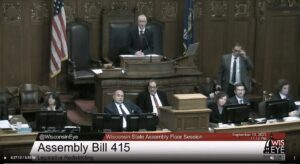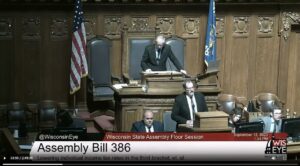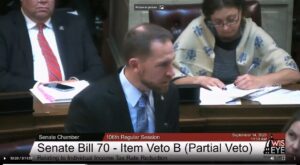
In this update:
- Legislative Updates
- Supreme Court Updates
- Election Updates
Legislative Updates
Assembly passes GOP bill that would overhaul legislative redistricting

During its Thursday floor session, the Assembly passed a new legislative redistricting bill that would overhaul the state’s current system for determining legislative maps and have new maps in place by the 2024 elections. Congressional maps would not be affected by the proposal. The bill, AB 415, was approved 64-32 with Rep. LaKeshia Myers (D-Milwaukee) joining all Republicans in support. The proposal directs the nonpartisan Legislative Reference Bureau (LRB) to draw redistricting plans based upon standards specified in the bill and establishes a redistricting advisory commission to perform certain tasks in the redistricting process. Republicans floated the bill as an “Iowa-style nonpartisan redistricting model” that would allow both parties to bypass expensive lawsuits filed with the state Supreme Court that seek to overturn the state’s current legislative maps. Speaker Robin Vos (R) called the proposal an “off-ramp to impeachment.” Meanwhile, Democrats labeled the move a last-ditch effort by Republicans to maintain their control over the state legislature, while also pointing out several key differences between Iowa’s actual redistricting model and the plan proposed by Republicans. Despite the bill’s passage in the Assembly, Senate Majority Leader Devin LeMahieu (R) remained noncommittal on whether the Senate would consider the redistricting proposal.
Features of the plan include the following:
Redistricting Standards
A redistricting plan drawn by LRB must satisfy several criteria including:
- Must comply with population requirements under state and federal law that prohibit a redistricting plan from abridging the right to vote on account of race or color or because a person is a member of a language minority group.
- Must satisfy equal population standards.
- District boundaries under the plan must coincide with municipal ward boundaries and, to the extent consistent with state and federal law, must coincide with the boundaries of political subdivisions. The number of political subdivisions divided among more than one district must be as small as possible and must preserve the communities of interest.
- Districts must be composed of convenient contiguous territory and must be compact.
- No district may be drawn for the purpose of favoring a political party, incumbent legislator, or other person or group.
Redistricting advisory commission
- The bill creates a redistricting advisory commission made up of five members with the speaker and minority leader of the Assembly and the majority and minority leaders of the Senate each appointing one member. The four commission members then select a fifth member to serve as chairperson.
- The advisory commission is responsible for making available to the public copies of redistricting bills, as well as conducting public hearings on redistricting bills.
Redistricting process
- No later than January 1 of the second year following the federal 10-year census, the LRB must deliver to the majority leader of the senate and speaker of the assembly identical redistricting bills drawn in accordance with the standards described above.
- The assembly or the senate must then bring the bill to a vote. During the vote, only amendments that correct errors shall be permitted. If the bill passes the first chamber, then it must be expeditiously voted on in the second chamber under the same rules.
- If the redistricting bill is not approved by both the Assembly and Senate, the LRB must prepare a second set of identical bills that takes into account the reasons the first set of bills were rejected. If the second plan is not approved by both chambers, then LRB must prepare a third set of identical bills under the same procedures as the second set. Unlike the first two sets of bills, the third set can be amended by a simple majority of the legislature.
-
The redistricting bills may only be passed by a bipartisan, simple majority vote. A 2/3rds majority would be required to override a gubernatorial veto of the maps.
Senate votes to remove Wolfe as WEC administrator
 During Thursday’s floor session, the Senate voted 22-11 along party lines to remove Meagan Wolfe as administrator of the Wisconsin Elections Commission (WEC). Directly following the vote, Senator Devin LeMahieu (R) presented a resolution for the WEC to appoint a replacement for Ms. Wolfe. However, Democrats argued the floor vote was meaningless because WEC never re-nominated Ms. Wolfe for a second term. Democratic Attorney General Josh Kaul then filed suit, asking for the courts to clarify whether Ms. Wolfe remains a lawful holdover. At a news conference following the floor vote, Ms. Wolfe said she would continue serving as elections administrator until a court ordered her to step down.
During Thursday’s floor session, the Senate voted 22-11 along party lines to remove Meagan Wolfe as administrator of the Wisconsin Elections Commission (WEC). Directly following the vote, Senator Devin LeMahieu (R) presented a resolution for the WEC to appoint a replacement for Ms. Wolfe. However, Democrats argued the floor vote was meaningless because WEC never re-nominated Ms. Wolfe for a second term. Democratic Attorney General Josh Kaul then filed suit, asking for the courts to clarify whether Ms. Wolfe remains a lawful holdover. At a news conference following the floor vote, Ms. Wolfe said she would continue serving as elections administrator until a court ordered her to step down.
The Senate’s rejection of Ms. Wolfe’s reappointed comes three months after a June meeting of WEC when all three Republican members of the elections commission voted to re-nominate Ms. Wolfe for another four-year term so that her nomination could be considered by the full state Senate, which was expected to vote down her confirmation. The three Democratic commissioners abstained from the vote — leaving the motion short of a majority — with the intent of stopping her nomination from going to the Senate, thereby keeping Ms. Wolfe in place as the WEC administrator. Despite the outcome of the June vote, Senate Republicans passed a resolution that Ms. Wolfe had been legally reappointed as WEC administrator and scheduled this week’s committee hearing and floor vote. In response, Democratic Attorney General Josh Kaul sent a letter to the Legislative Council director arguing “WEC has not appointed a new administrator, and there is no WEC administrator appointment before the Senate.” Ms. Wolfe then cited AG Kaul’s letter as justification for her decision to not engage with the Senate during its confirmation process.
Reaction to Senate Vote
Gov. Evers (D): “Wisconsin Republicans’ attempt to illegally fire Wisconsin’s elections administrator without cause today shows they are continuing to escalate efforts to sow distrust and disinformation about our elections, denigrate our clerks, poll workers, and election administrators, and undermine basic tenets of our democracy, including the peaceful transfer of power…I’m requesting the Wisconsin Department of Justice provide immediate representation to defend Ms. Wolfe so she can remain in this important role.”
Attorney General Josh Kaul (D): “The story today is not what the senate has purported to do with its vote. It’s that the senate has blatantly disregarded state law in order to put its full stamp of approval on the ongoing baseless attacks on our democracy. We are going to court to minimize the confusion resulting from today’s stunt and to protect a pillar of our democracy—the fair administration of elections.”
Senate Majority Leader Devin LeMahieu (R): “The vote today represents the lack of faith the people of Wisconsin have in Meagan Wolfe to serve as the administrator of the state Election Commission. The commission needs to appoint an interim who will participate in the process and rebuild faith in Wisconsin elections.”
Assembly passes new tax cuts, Senate overrides partial veto to earlier tax cuts


During Tuesday’s floor session, the Assembly voted and passed a nearly $3 billion tax cut. The bill was approved with a 64-35 vote along party lines despite Governor Tony Evers’ (D) promise to veto the bill. The bill, AB 386, would reduce income taxes for the third-highest tax bracket to 4.4% from 5.3%, while also expanding an existing tax break on retirement income. The tax cut would affect individuals with a taxable income between $27,630 and $304,170 and couples filing jointly between $36,840 and $405,550. For retirees over the age of 67, the bill also includes an exemption of up to $100,000 of retirement income for individuals and up to $150,000 for married couples. Assembly Speaker Robin Vos (R) said the tax cuts fulfill the promise lawmakers made to return money to the taxpayers.
Two days after the Assembly voted to approve the new tax cuts, the Senate overrode a partial veto from Gov. Evers that struck down a reduction to the two highest income tax brackets that had been passed by the legislature as part of the FY 2023-25 budget. The tax cut would have reduced the top tax bracket from 7.65% to 6.5% and the third-highest tax bracket from 5.3% to 4.4%. Republicans have the ability to override a veto from Gov. Evers by using their supermajority in the Senate where they outnumber Democrats 22-11. The matter now moves to the Assembly, where the GOP is two seats short of the supermajority required to override a veto. The last time the Legislature overrode a gubernatorial veto was in 1985.
Democrats have largely opposed both tax cuts on the grounds they disproportionately benefit the wealthy, could leave the state with a structural imbalance, and could jeopardize roughly $2.5 billion in federal COVID-19 funds received by the state and local governments.
Senate confirms Amundson
 On Thursday, the Senate voted 30-3 to approve Emilie Amundson as Secretary of the Department of Children and Families. Senator Julian Bradley (R), Senator Chris Kapenga (R), and Senator Steve Nass (R) opposed the re-nomination. Secretary Amundson was first appointed by Governor Evers in January 2019, and confirmed 32-1 by the Senate in February 2020, with only Senator Lena Taylor (D) voting no.
On Thursday, the Senate voted 30-3 to approve Emilie Amundson as Secretary of the Department of Children and Families. Senator Julian Bradley (R), Senator Chris Kapenga (R), and Senator Steve Nass (R) opposed the re-nomination. Secretary Amundson was first appointed by Governor Evers in January 2019, and confirmed 32-1 by the Senate in February 2020, with only Senator Lena Taylor (D) voting no.
Secretary Amundson received her undergraduate degree from UW-Madison, her Master of Education Policy from Harvard Graduate School of Education and has completed coursework toward a Ph.D. in Literacy Studies at UW-Madison.
Republican lawmakers introduce bill on mental health facilities
A new Republican-led bill being circulated would establish more mental health facilities to reduce the distance between the facilities and those struggling with mental health emergencies. The co-sponsorship memo says the bill is intended to not only help people with a mental health emergency, but also the police officers who are transporting them to a facility for treatment. In a press release announcing the bill, co-author Senator Howard Marklein (R-Spring Green) said he had heard “countless stories about individuals experiencing a severe mental health crisis who spend hours in the back of a squad car and driven many hours across the state to the Winnebago Mental Health Institute. This is a traumatic experience for the individual experiencing the mental health crisis and places a heavy burden on law enforcement.”
The bill requires the Department of Health Services (DHS) to create a certification process for 24/7 crisis urgent care and observation facilities. DHS would be required to obtain approval from the Joint Finance Committee (JFC) to certify a facility. The bill also requires DHS to establish a grant program to aid in supporting and developing these facilities. According to the bill’s authors, the grant program would be funded through a $10 million supplemental appropriation from JFC that has already been set aside in the 2023-25 state budget.
Supreme Court Updates
Impeachment talk continues in Madison
Discussion concerning the possible impeachment of liberal state Supreme Court Justice Janet Protasiewicz continued this week with outside groups launching advocacy campaigns, more lawsuits filed, and Speaker Robin Vos (R) convening a panel of former Supreme Court justices to determine what sort of conduct a justice would need to engage in to meet the threshold for impeachment.
The first action this week on the impeachment issue came when two voters who supported Justice Protasiewicz during the spring election filed suit seeking a permanent injunction barring the Assembly from starting impeachment proceedings against any state Supreme Court justice. Justice Protasiewicz promptly recused herself from the suit without providing additional explanation. Also on the legal front, the chairman of the Senate Judiciary and Public Safety Committee, Sen. Van Wanggaard (R) sent a letter to Justice Protasiewicz asking that she allow the release of all records concerning the complaints filed against her with the Judicial Commission. Last week, Justice Protasiewicz released a May 31 letter from the commission informing her the complaints made against her alleging she had violated judicial ethics codes had been dismissed, but no additional information on how the commission came to this determination was made available.
Also taking place this week, three outside groups announced advocacy campaigns to pressure Republican lawmakers to not impeach Justice Protasiewicz. The Republican Accountability Project launched an ad campaign focused on Speaker Vos and 21 other Republican legislators while For Our Future, a Democratic group, said it would send over 500,000 text messages to engage voters over the potential impeachment. Meanwhile, liberal group A Better Wisconsin Together started running digital and TV ads as part of a $4 million advocacy effort announced by Democrats last week. The same group also released a poll that found 24% of registered voters support impeaching Justice Protasiewicz while 47% were opposed. The poll was conducted by Democratic polling firm GBAO on Sept. 7-10 using landline, cell phone, and text-to-web. The margin of error is +/-4%. FiveThirtyEight rates GBAO a B/C pollster.
Lastly, Speaker Vos announced the creation of an “impeachment criteria panel” made up of three former Wisconsin Supreme Court justices tasked by the Speaker with determining what conduct by a justice meets the threshold for impeachment. As part of its work, the panel will also review how the impeachment process works and whether Republicans would be doing something outside the norm. Speaker Vos declined to provide the names of the justices appointed to the panel, saying he didn’t want them to be influenced prior to reporting back to him at the end of the month.
Election Updates
Stacey Klein to run for GOP nomination for U.S. Senate

Stacey Klein said she will run for the Republican nomination to challenge U.S. Senator Tammy Baldwin (D) next fall. Ms. Klein was elected to the Trempealeau County Board in 2020 and currently serves as supervisor. Ms. Klein grew up in Trempealeau County on a dairy farm and attended Carthage College in Kenosha before returning to Trempealeau County to work as a financial advisor. Ms. Klein said the main focuses of her campaign are education and reducing government spending.
Rejani Raveendran was the first candidate to announce a bid for the GOP nomination for U.S. Senate. The 40-year-old UW-Stevens Point chair of the College Republicans announced her plans last month to run but has not registered as a candidate with the FEC. Madison businessman Eric Hovde, Franklin businessman Scott Mayer, and former Milwaukee County Sheriff David Clarke have also been floated as possible Republican candidates to face Senator Baldwin.
Senator Baldwin was first elected in 2012 with 51.5% of the total vote. In that race, she defeated former Gov. Tommy Thompson (R) by a margin of 5.6 percentage-points. Sen. Baldwin was then re-elected in 2018 with 55.4% of the vote. She defeated former state Senator Leah Vukmir (R) by a margin of 10.8 percentage-points.



